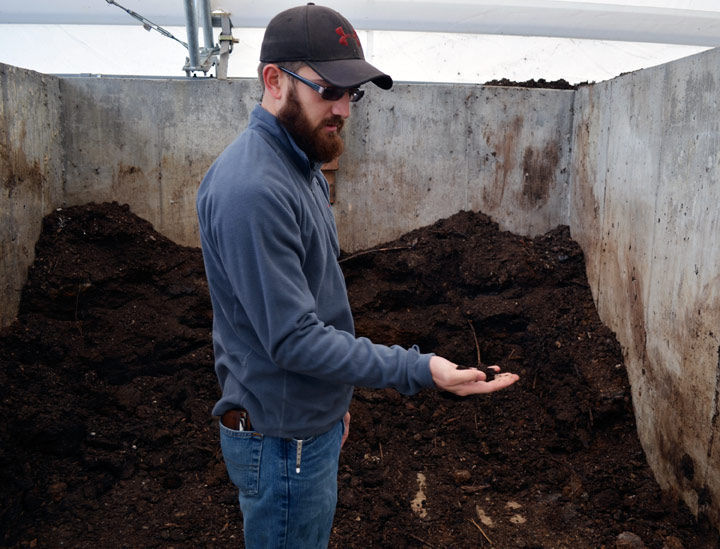Burying wasteful ways with audits and composting facility
November 11, 2015
Around 40 million tons of food waste are added to landfills in the U.S. every year, according to the Food Waste Reduction Alliance.
To combat the problem, the university is holding regular food waste audits and using a new composting facility on campus.
Even after the university eliminated trays from the dining halls in 2008, preventing consumers from carrying a lot of food, staff still noticed a lot of food waste. The change prevented an estimated 66,000 pounds of food waste, according to the SIU Sustainability website.
Advertisement
The first audit by the dining hall staff took place at Lentz Dining Hall last week. Instead of students putting dirty dishes on a conveyer belt that takes it to another room to be cleaned, staff members separated solid and liquid food waste into containers in front of students.
Bill Connors, executive chef for University Housing, said after three hours, about 100 pounds of waste had accumulated from about 850 students, equaling about 1.9 ounces of waste per person.
“My eyes are usually bigger than my stomach, so I usually get a lot more than I can eat,” said Miranda Fair, a freshman from Hillsboro studying hospitality and tourism.
Peggy Connors, associate director of Residence Hall Dining, said students often take more food than they are hungry for.
“Students feel that, since they are paying for food, they should take as much as they can,” Peggy said. “We’re trying to get students away from that mindset.”
She hopes the piles of wasted food during the audits help.
University housing and dining services will host another food and waste audit from 11 a.m. to 2 p.m. Thursday in Trueblood Hall. The audits are planned for twice a semester in the future to motivate students to waste less.
Advertisement*
“Zero waste is a process,” Bill said. “And we’ve been working towards it for a long time.”
Though this may not be reflected on the plates filled with uneaten food, zero waste may be possible with the help of the university’s new composting system.
The new composting facility, located off Pleasant Hill road near the university farms, was funded partially by grants from the SIU Green Fund and the Illinois Department of Commerce and Economic Opportunity, SIU Sustainability Coordinator Geory Kurtzhals, said via email.
Karen Midden, associate dean of the College of Agriculture, helped obtain facilities permit from the Illinois Environmental Protection Agency. The permit was approved Monday.
The university already has a vermicomposting facility — where worms compost everything from vegetable waste to coffee grounds from Starbucks in the Student Center — but wanted to process more.
“We built the facility to handle composting through the whole university,” Bill said.
The facility will take both pre-consumer waste, such as food trimmings, and post-consumer waste, including leftovers on plates, Bill said.
The new facility uses an aerated system to speed up the composition process.
Midden said forced aeration is done by laying pipes at the bottom of multiple 10-by-10 6-foot bins in order to force air into the waste so material does not have to be stirred.
“Each bin should only take about 60 days with this system,” Brett Wilson, a graduate student in agriculture systems and education from Paris, said. This is less time than if the aeration system was not in place.
Wilson is in charge of various aspects of the facility, such as cleaning and creating compost piles.
He said decomposing materials he uses include garden, food, landscape, farm and feed waste. He monitors the materials during the decomposition process.
Midden said the resulting material created is highly nutritious soil for plants.
Bill said the university is hoping to put the fertilizer in the fields and gardens on campus, including the Sustainable Farm.
With the regular audits and use of the new composting system in place, SIUC will keep more waste out of the landfills and producing more fertilizer.
“For so many people, food is taken for granted,” Peggy said.
Anna Spoerre can be reached at [email protected] or @ASpoerre_DE
Advertisement









